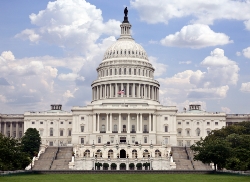

For more than 30 years, Congress has enacted Trade Promotion Authority (TPA) laws to guide both Democratic and Republican Administrations in pursuing trade agreements that support U.S. jobs, eliminating barriers in foreign markets and establishing rules to stop unfair trade.
TPA does not provide new power to the Executive Branch. TPA is a legislative procedure, written by Congress, through which Congress defines U.S. negotiating objectives and spells out a detailed oversight and consultation process for during trade negotiations. Under TPA, Congress retains the authority to review and decide whether any proposed U.S. trade agreement will be implemented.
With Trade Promotion Authority, the United States will be able to pursue 21 st century trade agreements that support and create U.S. jobs while helping American manufacturers, service providers, farmers and ranchers increase U.S. exports and compete in a highly competitive, globalized economy.
Since 1974, Congress has enacted TPA legislation that defines U.S. negotiating objectives and priorities for trade agreements and establishes consultation and notification requirements for the President to follow throughout the negotiation process. At the end of the negotiation and consultation process, Congress gives the agreement an up or down vote, without amendment. TPA reaffirms Congress’s overall constitutional role in the development and oversight of U.S. trade policy.
Key elements of TPA—
(1) TPA outlines Congressional guidance to the President on trade policy priorities and negotiating objectives.
(2) TPA establishes Congressional requirements for the Administration to notify and consult with Congress, with the private sector and other stakeholders and with the public during the negotiations of trade agreements.
(3) TPA defines the terms, conditions and procedures under which Congress allows the Administration to enter into trade agreements, and sets the procedures for Congressional consideration of bills to implement the agreements.
Every $1 billion in exports of U.S. goods and services supports more than 5,000 U.S. jobs. In 2012, exports of U.S. goods and services supported an estimated 9.8 million American jobs, including 25 percent of all manufacturing jobs. Expanded exports have added 1.3 million American jobs since 2009, and those export-supported jobs pay 13 to 18 percent higher than the national average wage. The way to support more of these high-paying jobs is to expand trade and investment opportunities. And the way to make sure that happens is to support TPA.
We know that exports support American jobs. And we know that U.S. trade agreements sustain those job-supporting exports: our agreements with just 20 partners support 46 percent of our country’s goods exports overall. In fact, exports accounted for a third of U.S. growth since 2009. The trade agreements we’re working on right now – T-TIP and TPP – account for 65 percent of the world’s goods and services trade and would account for 69 percent of U.S. goods exports. TPA will help to get those agreements in force and support American jobs.
Through TPA, Congress outlines high-standard objectives and priorities for U.S. negotiators to pursue in trade agreements, a process which helps build consensus on U.S. trade policy. Upwards of 250 trade agreements between other countries are in force and many more are currently being negotiated. While these agreements are not the high-standard, comprehensive trade agreements the U.S. negotiates, foreign companies have better and cheaper access to these markets and this places U.S. workers, businesses and farmers at a relative disadvantage. In fact, China and Europe are currently negotiating agreements with other Asia-Pacific partners that could displace U.S. goods, services and agriculture products and set standards that exclude the U.S. exports from their markets.
Updating TPA ensures our trading partners know U.S. negotiators have the support of Congress when we call for greater ambition and stronger, high-standard trade agreements. This is particularly important on newer issues affecting our ability to compete in the global economy, such as leveling the playing field between state-owned enterprises and our private firms. Moreover, high-standard agreements encourage countries outside U.S. trade agreements to raise their own standards. And that helps American businesses and workers compete better globally.
TPA bills establish consultation and notification requirements for the President to follow throughout the trade agreement negotiation process – ensuring that Congress, stakeholders and the public are closely involved before, during and after the conclusion of trade agreement negotiations. And TPA explicitly retains Congress’s ultimate authority to decide whether the United States will implement any trade agreement.
Since the Administration notified Congress of our intent to enter negotiations of the TPP in 2009, USTR has closely followed Congressional objectives and notification and consultation provisions required under TPA. USTR has consulted hundreds of times with Congressional committees with jurisdiction over international trade negotiations, consistently requesting input on the direction, focus, and content of TPP negotiations. And USTR continually meets with Members and staff from other committees regarding particular issues of interest.
In addition to our congressionally mandated committees of industry and public sector advisers , the United States consults with all interested stakeholders at each trade agreement negotiating round and in between. We do this to share information and get views that make the negotiated product better. For TPP, these stakeholders have included representatives from academia, labor unions, the private sector, and non-governmental organizations. Under TPA, this activity would continue and be strengthened.
Resource List: